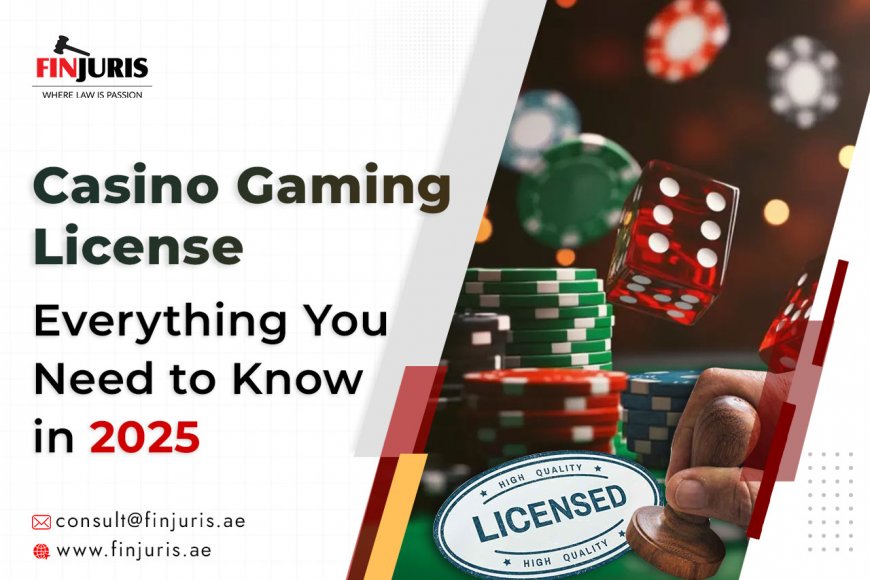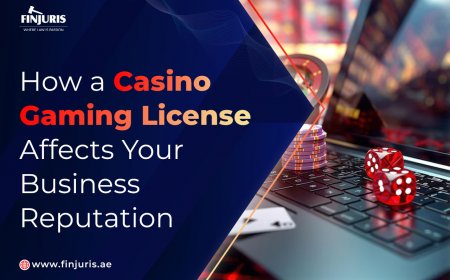Casino Gaming License: Everything You Need to Know in 2025
Learn key steps, legal requirements, and global trends for obtaining a casino gaming license in 2025 for compliant operations.

The casino industry, both online and land-based, is a high-revenue sector that requires robust legal infrastructure and licensing to operate legitimately. With the global gambling market projected to surpass $800 billion by 2026, entrepreneurs are increasingly seeking proper casino gaming licenses to launch or expand their operations in regulated jurisdictions.
A casino gaming license not only ensures compliance with legal standards but also builds credibility with players, payment processors, software providers, and regulators. Whether you plan to operate a physical casino, an online gambling platform, or a hybrid model involving cryptocurrency or blockchain, obtaining the right license is the first and most critical step.
This article provides a comprehensive guide on what a casino gaming license is, why it is essential, where to apply, key requirements, costs, compliance expectations, and how to choose the right jurisdiction in 2025.
What Is a Casino Gaming License?
A casino gaming license is a legal authorization granted by a governmental authority or regulatory body that allows an entity to offer gambling or betting services legally. These licenses can apply to:
- Online casinos
- Land-based casinos
- Sports betting platforms
- Poker and bingo rooms
- Live dealer games
- Virtual and cryptocurrency-based gambling services
Depending on the jurisdiction, the scope of permitted activities and compliance obligations can vary significantly.
Read More: The Ultimate Guide to Obtaining a Casino Gaming License
Why You Need a Casino License
Operating a casino without a license is considered illegal in most jurisdictions and can lead to severe penalties, including fines, asset seizures, and criminal charges. A valid casino gaming license offers several key advantages:
1. Legal Authorization
Licensing ensures that your operations comply with national or regional laws governing gambling and anti-money laundering (AML).
2. Credibility & Trust
Players are more likely to engage with a licensed operator due to the assurance of fair play, transparent transactions, and regulated dispute resolution.
3. Payment Processing
Most banks and payment gateways (including crypto processors) require valid licenses to enable transactions related to gambling.
4. Software Partnerships
Major gaming software providers (e.g., NetEnt, Microgaming, Evolution Gaming) work only with licensed operators.
5. Global Reach
Licensing in reputable jurisdictions opens doors to international markets and affiliate marketing opportunities.
Read More: How a Casino Gaming License Affects Your Business Reputation
Key Licensing Jurisdictions in 2025
Choosing the right jurisdiction depends on your business model, target markets, budget, and risk appetite. Here are some of the most prominent options:
1. Malta Gaming Authority (MGA)
- Highly respected EU-based regulator
- Suitable for online casinos, poker, and sports betting
- Requires physical presence and strong compliance controls
- Licensing timeline: 4–6 months
- Cost: €25,000+ annual fees plus taxes
2. Curacao eGaming
- One of the most affordable and popular jurisdictions
- Ideal for startups and crypto casinos
- One license covers all verticals
- Faster processing time (2–4 weeks)
- Cost: $15,000–$20,000 (initial year)
3. Isle of Man Gambling Supervision Commission
- Strong regulatory reputation with crypto-friendly policies
- Suitable for large-scale casino platforms and fintech integrations
- Physical presence required
- Cost: £35,000+ per year
4. Kahnawake Gaming Commission (Canada)
- Attractive for North American market entrants
- Accepts digital gaming and blockchain-based models
- License costs around $40,000 annually
5. UK Gambling Commission (UKGC)
- Stringent due diligence and compliance obligations
- High operating costs and regulatory pressure
- Best suited for well-funded operators targeting the UK market
Application Process Overview
While the specifics may vary by jurisdiction, the casino gaming license application typically includes the following steps:
- Business Entity Formation
Incorporate a company in the chosen jurisdiction or as required by the regulator. - Due Diligence & Background Checks
Owners, directors, and key personnel must undergo KYC/AML checks and submit personal declarations. - Submission of Required Documents
This includes a detailed business plan, financial projections, software system architecture, anti-fraud and AML policies, source of funds verification, and compliance manuals. - Technical Setup Review
Many regulators conduct audits or system verifications to confirm fairness (RNG certification), player data protection, and transaction transparency. - Compliance Interview or Audit
Some jurisdictions may conduct live interviews or preliminary audits before granting approval. - License Issuance & Ongoing Reporting
Once approved, operators must maintain compliance with reporting schedules, player safeguards, tax payments, and technical standards.
Compliance Obligations
Operating under a casino license is not a one-time event but an ongoing relationship with the regulator. Key obligations include:
- KYC/AML monitoring and reporting (including suspicious transaction reports)
- Fair gaming standards and regular RNG testing
- Responsible gambling tools and player protection mechanisms
- Regular financial and operational audits
- Player dispute resolution mechanisms
- Transparent and secure payment gateways
Failure to meet these obligations may result in suspension, fines, or revocation of the license.
Costs Involved
The total cost of obtaining and maintaining a casino license includes:
- Government license application fee
- Annual renewal fees
- Legal and consultancy fees
- Office setup and local representation (if required)
- Software testing and certification fees
- AML/KYC software and system costs
- Employee background checks
Estimated initial costs range from $15,000 to $150,000 depending on the jurisdiction, scope, and complexity of operations.
Crypto Casinos and Blockchain Licensing
In 2025, many casino startups are integrating cryptocurrencies for deposits, withdrawals, and wagers. Jurisdictions like Curacao, Isle of Man, and Anjouan offer flexibility for crypto casinos, provided they meet AML requirements and integrate verifiable transaction records.
Read More: The Role of Crypto Consulting Firms in Enterprise Blockchain Adoption
Operators in this space should also consider:
- Wallet security architecture
- Smart contract audits for provably fair games
- Blockchain-based RNG validation
- Compliance with FATF Travel Rule and VASP guidance
Choosing the Right Licensing Strategy
Here are five strategic factors to consider when selecting a licensing jurisdiction:
- Target Market Access – Will the license allow you to legally operate in your core audience’s jurisdiction?
- Cost Efficiency – Can you meet ongoing fee and infrastructure requirements?
- Time to Market – How quickly do you need to launch?
- Regulatory Rigor – Are you prepared for strict compliance audits or do you need a simpler framework?
- Crypto-Friendliness – Do you need a license that supports blockchain, digital wallets, or token-based models?
Read More: Casino Gaming License: A Complete Guide for Operators
Obtaining a casino gaming license is a foundational step for anyone looking to enter or expand in the online gambling industry. It ensures legal compliance, facilitates trust, and opens doors to scalable growth. Whether you are launching a live dealer platform, a mobile betting app, or a decentralized casino, the right license can make or break your operation.
As regulatory environments evolve rapidly in 2025, partnering with a legal consultancy experienced in gaming and fintech compliance can streamline your journey and help you stay ahead of emerging obligations.
What's Your Reaction?




















